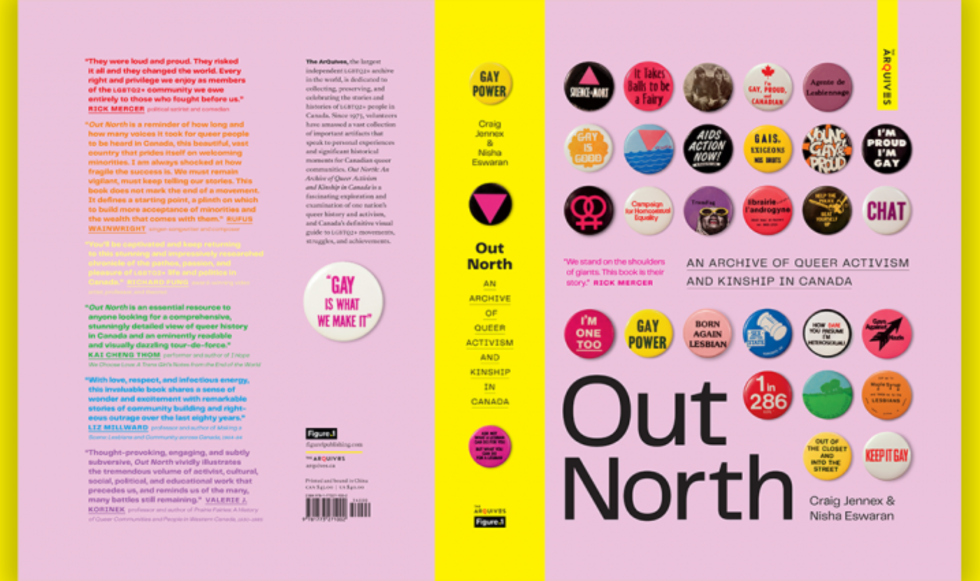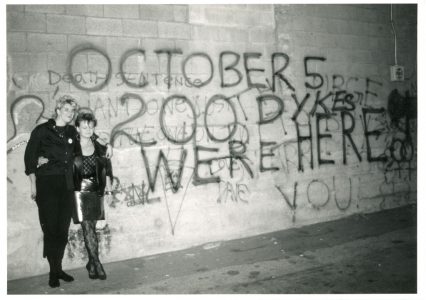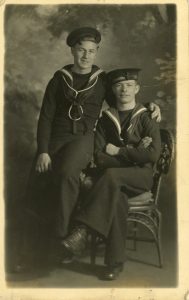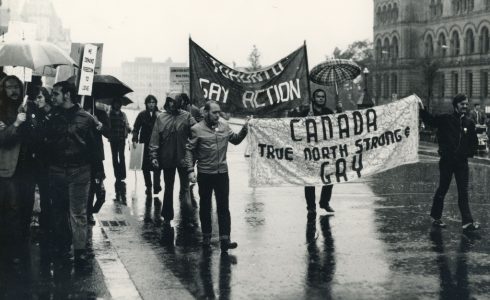Community, kinship and resistance

The front and back covers of Out North: An Archive of Queer Activism and Kinship in Canada
BY Sara Laux
July 7, 2020
A course at Mac called “The Archives in Everyday Life” introduced Craig Jennex to the ArQuives, formerly the Canadian Lesbian and Gay Archives.
“[Professor] Mary O’Connor told me there was a queer archive in Toronto, and I went there one night when it was open – and I started volunteering from that moment,” says Jennex, whose PhD research at McMaster focused on queer and feminist popular music performance.
Now an assistant professor of English at Ryerson, Jennex still works at the ArQuives — and his connection to it just got a little stronger.
This month, Jennex and former McMaster classmate Nisha Eswaran, a PhD candidate in English and Cultural Studies, released Out North: An Archive of Queer Activism and Kinship in Canada, an exploration of queer history and activism in Canada using the ArQuive’s extensive collection – the largest independent LGBTQ2S archive in the world.

The book, which is intended for a general audience, contains highlights from the ArQuives, including photos, letters, journal entries and even photos of matchbook covers. The book concentrates largely on community and activism from 1939 onwards, but also provides a brief history of “Queer Happenings” in the country before the Second World War.

Using the documentary artifacts in the book – which form only a tiny part of the ArQuives collection – Out North provides not only a history lesson, but a tangible record of the friendships and relationships that helped shape queer activism in Canada.
“Friendship informs the creation of the archive in the first place,” says Amber Dean, an associate professor of English and Cultural Studies at McMaster, who co-wrote the afterword to the book with Phanuel Antwi, an assistant professor of English at UBC who completed his PhD in English and Cultural Studies at McMaster.
“My sense of the story that the book tells of the forming of the archive is that it grew out of an intense period of activism in what was then called the Gay Liberation Movement in Canada. There were all kinds of intense friendships that came together, fell apart, but remained bound by activism.”
In fact, friendship was a powerful theme for the authors of the book, as well as the subjects.
“We can’t think of this book outside of our friendship,” says Antwi. “All four of us, over the years, have gained friends, fallen apart, come back together – that kind of nexus also forms the archives in the book.”
Friendship worked behind the scenes during the writing of the book as well.
“So many people supported the book from all over the place – in the archives, and people that we know,” explains Eswaran. “There were a couple of months where things were really frenzied, and in those months people dropped off food to my house, and did my laundry – it’s really been a collective project.”

While the ArQuives are not without criticism – all the authors acknowledge the limitations of traditional archives, especially when it comes to telling the stories of people of colour – Jennex says that they can, nonetheless, help provide inspiration for future struggles.
“Something that binds all four of us together is that we all feel there’s a potential in this history – there are so many unrealized revolutions that can continue to inform what we do in the present and how we think about the future,” he explains.
“Archives have a role,” adds Antwi. “I’m hoping that their role is not only to affirm something that many of us know already, but also to inspire us to imagine something that the archive may not be able to do for us.
“A return to the archive is the beginning that propels something else.”


